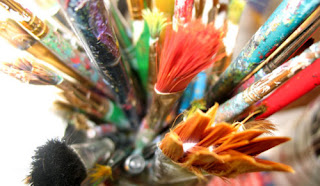It started with a tweet. A
guy named Murphy with whom I had attended an arts show months earlier.
‘Artist needed. I look to
commission a painting’ then trails of short direct messages ensued; ‘I know a
guy, who knows a guy, who can hook you up’.
It was Sunday when I first
met Yemi. I remember particularly that the sun shone bright and hot. And my
head ached, the kind of head ache that said clearly you didn’t belong in the
sun.
My car lazily pulled into First Bank’s parking lot. This has to be the
smallest bank branch I thought as she came into the front passenger’s seat;
‘Good Afternoon’ she said
without saying her name as though being nameless was a show of respect. I nodded and said ‘Just give me
directions’.
I remember her smell as it
filled the space in the air conditioned car. I first thought cinnamon and later
changed my mind and agreed she just smelt of paint; that icky combination of
paint and dried up sweat.
It was not until we got to
her studio that she took off her headscarf and I saw her hair: uneven, ruffled
and all natural. She wore no make-up; like she made no effort whatsoever, like
there was no reason to make an effort.
Now it is close to a month
and she is ready to deliver my painting. She sends me a photo of it first to
let me know what I am expecting. I send her a message saying it is crooked. We
go back and forth and she tries to justify its crookedness. I insist it is
crooked but for the sake of what may be a friendship, I let it slide.
‘Please deliver it
promptly and in good condition’ I reply.
As she hangs it on the
wall I step back and look. Wondering, admiring, I have never doubted her talent
and this painting proved that any doubt would have been misplaced.
For the first time, I
notice the smooth skin on her arms, her full lips and I wonder what they would
feel like if I kissed them. Instead, I say ‘Thank you’ and point to some blemishes on the frame
‘You have to polish these up’.
‘I will do that when next
I come’ she says and I am pleased. This is indicative of her want to return, of
her want to see me again. It is proof that the slight chemistry between us was
not felt by me alone.
She returns as promised and I wish she did not just present herself only as an artist
delivering a commissioned painting. I
wished she saw herself as a friend, or someone who was at least welcome in my
house. I had demonstrated this on
the two occasions when I offered her a drink or a snack or just a seat or that
other time when I sent her a message asking her to stop by at will. All those
offerings, she refused.
After she left we
exchanged messages again.
‘Thanks’ I say. ‘You’re
Welcome. Regards to your mum and dad’ she replies and I wish she would not be
so professional; only focused on her art and never saying anything personal.
‘They’d hear. They both
live out of town’ surely that ought to lure her into conversation, I thought.
It didn’t.
I
sigh a heavy sigh and feel dispirited.
I
remember Murphy saying to me in a message ‘This artist is professional’ and I
wonder why he pointed that out. I look back to the painting, there’s a woman
seated cross-legged with purity bursting out of her chest. I say to myself
‘At
least I will always have a piece of her’.
Have any stories where you tried to blur the lines between professionalism and leisure? By all means, share in the comments...
Adejoh Momoh (momoh.adejoh@gmail.com) can be followed on twitter @adejoh












